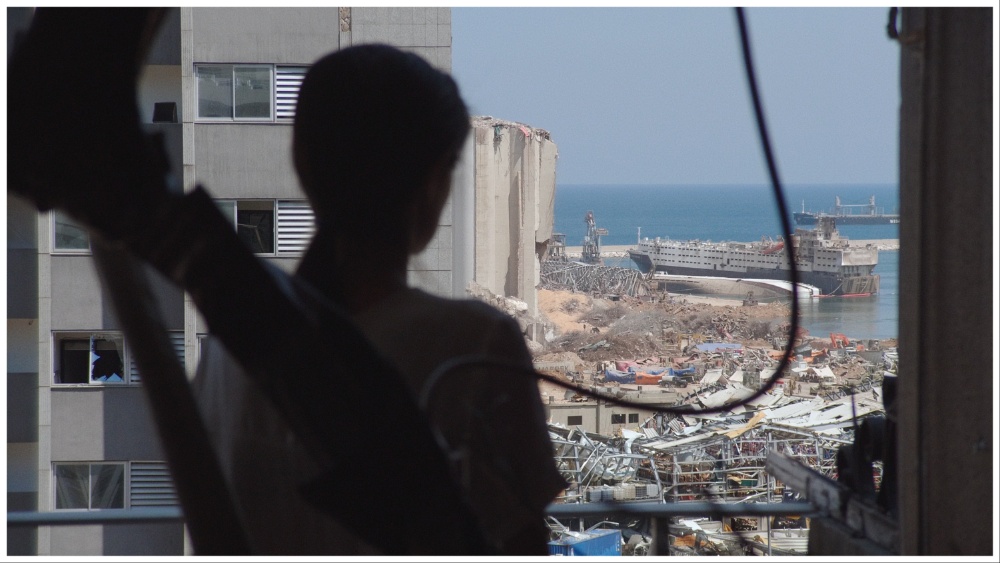
Cyril Aris and his frustrated protagonists in “Dancing on the Edge of a Volcano” are done mincing words.
“I hope this film can be screened the way it is, although it’s not painting the brightest picture of the Lebanese political class. And if they censor it, thank you for the publicity. I will take it,” he says following its premiere at Karlovy Vary Film Festival.
“In Lebanon, we have leaders who are experts in divide-and-conquer. That’s how they fire up their base and that’s what happened in the port of Beirut, too. There is this theory that everyone knew what was happening, but they were paid for their silence.”
In his documentary, produced by Reynard Films and Abbout Productions, Aris explores the aftermath of the “traumatic” 2020 explosion.
“Everyone thought it happened on their street,” he recalls.
But he also follows the many misadventures of the team behind Nadine Labaki’s starrer “Costa Brava, Lebanon.” Deciding to keep on working despite the tragedy that paralizes the set, the pandemic, electricity shortages and dreadful weather conditions.
Cyril Aris
Courtesy of Reynard Films/Abbout Productions
“It was very important not to do another ‘making of,’” he states, although his film has already drawn comparisons to “Lost in La Mancha,” about Terry Gilliam’s first attempt to make “The Man Who Killed Don Quixote” or 1991’s “Hearts of Darkness: A Filmmaker’s Apocalypse.”
“Through their obstacles, I could talk about the economic crisis, about the mismanagement of state services. My references were closer to the films of Maroun Bagdadi, like ‘Whispers’ [made in 1980] about a poet who comes back to the destroyed Beirut. We talk about the same thing. That’s the tragedy of Lebanon: history repeats itself.”
Initially filming other artists as well, he decided to stick to the “Costa Brava” team led by director Mounia Akl.
“They were debating whether to shoot [given the circumstances] and it was something I was asking myself too. What is my role as a filmmaker in this apocalypse? What is the role of art in this dystopia? Are Lebanese people really resilient or are we just delusional?,” he wonders.
“There was this skepticism: ‘What are we doing?! Why are we making a film now?’ But in a way, you don’t have a choice.”

“Dancing on the Edge of the Volcano”
Courtesy of Reynard Films/Abbout Productions
As time went by, the team was getting even more determined, he observes, recalling some of the jokes that made it into the finished doc. From “We still have water. It just comes with a bit of glass” to someone describing their job as “mixing a movie on the Titanic.”
“Lebanese people use humor a lot in the most desperate circumstances,” he laughs.
“They were feeding off each other’s energy. At one point, Mounia said to me: ‘If our shoot goes well, you don’t have a film. If it doesn’t happen, you have a great one’.”
While Akl and her collaborators were ultimately granted a happy ending, with the film premiering in Venice and even scoring an award in Toronto, things at home stayed the same.
“A lot of people have abandoned this country already. In 2018, we had a major uprising against the political class, or should I say the political ‘mafia.’ But it didn’t lead to any major change, or any change at all,” he admits.
“Very shortly after the explosion, in the absence of the government – because we don’t have any – people took to the streets. Everyone wanted to erase what had happened. I was inspired by that resilience, but we say that Beirut was destroyed and rebuilt seven times.”
“One of the characters is the film observes: ‘We are getting used to seeing it.’ There is always this co-existence between sadness and endless hope, transmitted from generation to generation.”
He adds: “In Lebanon, there is always a crisis. Financial, environmental, social. At one point, Mounia asks her father: ‘How can you keep creating if you are constantly going against the current?’ He says: ‘I believe these tragedies can lead to something beautiful’.”












